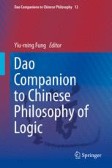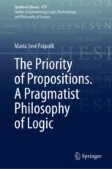Search
Search Results
-
The semantic view of computation and the argument from the cognitive science practice
According to the semantic view of computation, computations cannot be individuated without invoking semantic properties. A traditional argument for...
-
Semantic theories, linguistic essences, and knowledge of meaning
This paper argues, first, that the information problem poses a foundational challenge to mainstream semantics. It proposes, second, to address this...

-
A defence of the austere view of nonsense
The austere view of nonsense says that the source of nonsense is not a violation of the rules of logical syntax, but nonsense is always due to a lack...
-
Naming, Reference and Truth
This writing focuses on those most reflectively interesting and arguably representative ideas on the issue of reference, as a semantic issue, in...
-
These degrees go to eleven: fuzzy logics and gradable predicates
In the literature on vagueness one finds two very different kinds of degree theory. The dominant kind of account of gradable adjectives in formal...

-
Quine’s Underdetermination Thesis
In On Empirically Equivalent Systems of the World from 1975, Quine formulated a thesis of underdetermination roughly to the effect that every...

-
Chapter 10 What Is the Sense in Logic and Philosophy of Language?
In the paper, various notions of the logical semiotic sense of linguistic expressions—namely, syntactic and semantic, intensional and extensional—are...
-
The true futures
In this paper various branching time semantics are compared with the aim of clarifying the role of true futures of counterfactual moments, that is,...

-
Truth Attending Persuasion: Forms of Argumentation in Parmenides
Parmenides marks a watershed in the history of argumentation, presenting the earliest surviving sequence of recognizably deductive reasoning in the...
-
Quantification in the interpretational theory of validity
According to the interpretational theory of logical validity (IR), logical validity is preservation of truth in all interpretations compatible with...

-
Truth Maintenance
Abstract
-
Metasequents and Tetravaluations
In this paper we treat metasequents—objects which stand to sequents as sequents stand to formulas—as first class logical citizens. To this end we...
-
What Is a Scientific Theory?
In this chapter I first present the objectifying attitude, which is characteristic of science, in contrast with the holistic attitude, which is...
-
The Completeness Theorem? So What!
Bolzano reduced inferential validity of the inference (from premise judgements to conclusion judgment) to the holding of logical consequence between...
-
Informal Proof, Formal Proof, Formalism, and Fictionalism
The fictionalist aims to avoid commitment to mathematical objects by replacing mathematical truth with fictional correctness: truth-in-the-story (of...
-
Non-doxastic Attitude Reports, Information Structure, and Semantic-Pragmatic Interface
Truth conditions of sentences ascribing non-doxastic propositional attitudes seem to depend on the information structure of the embedded clause. In...

-
Reassessing truth-evaluability in the Minimalism-Contextualism debate
The debate between Semantic Minimalism and Radical Contextualism is standardly characterized as concerning truth - evaluability —specifically, whether...
-
The Inference-Marker View of Logical Notions: What a Pragmatist Proposal Looks Like
In this chapter, I discuss an informed pragmatist proposal for characterising the class of logical constants, which I call ‘the inference-marker...
-
Compositionality in Context
Compositionality is a principle used in logic, philosophy, mathematics, linguistics, and computer science for assigning meanings to language...
-
A fixed-point problem for theories of meaning
In this paper I argue that it’s impossible for there to be a single universal theory of meaning for a language. First, I will consider some minimal...
